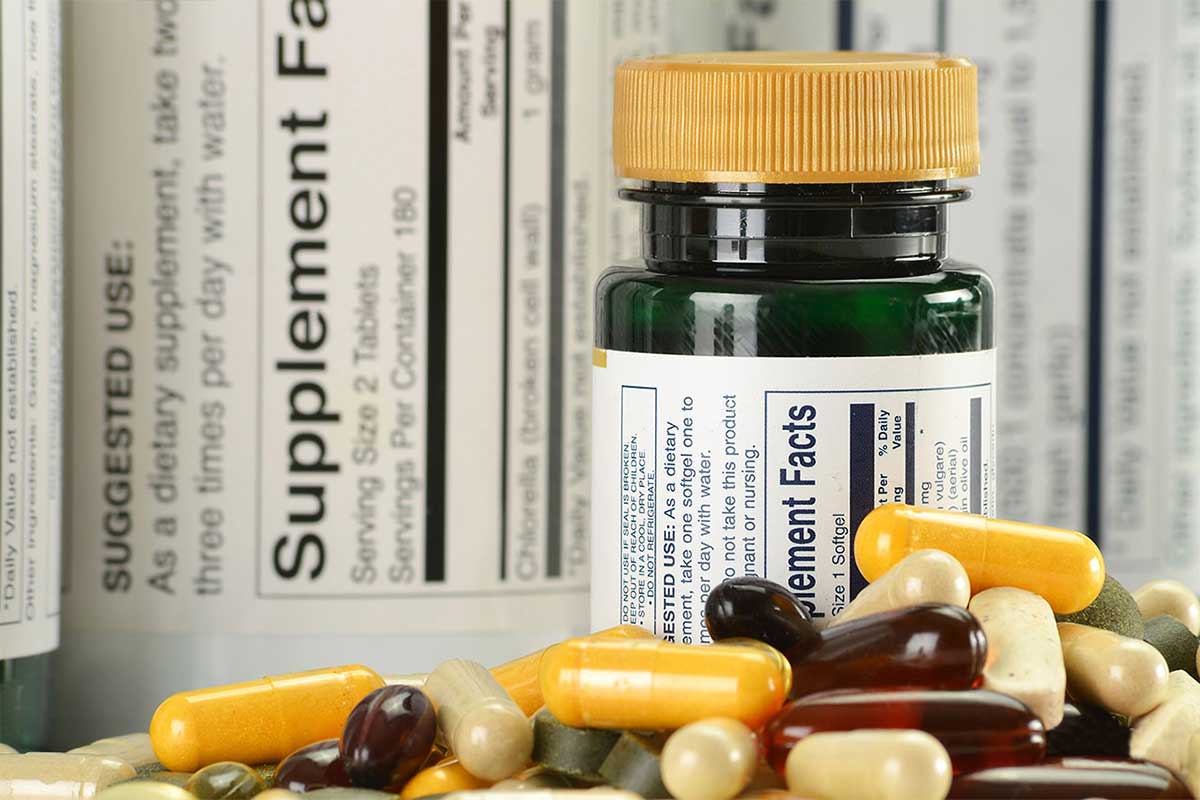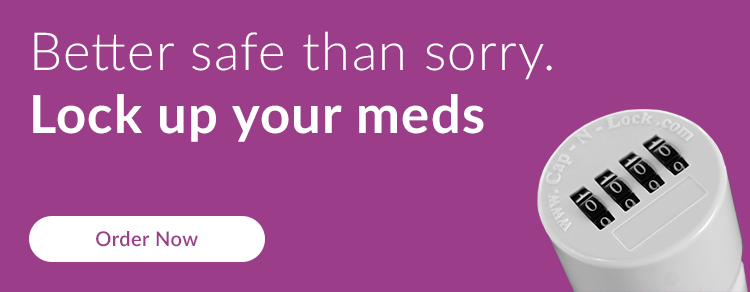Vitamin and all-natural herbal supplements may sound safe and harmless, but these seemingly innocuous pills pose a real safety risk to your child. Before you leave a vitamin or supplement bottle within reach of your little one, find out the possible risks of doing so. Child poisoning is a real risk for parents, and even “innocent” or “healthy” supplements could poison your child. Discover which supplements in your home could result in a potentially fatal case of vitamin toxicity — and what you can do to protect your kids against this cause of accidental child poisoning at home.
Iron Supplements
Most of the iron in the body is found in red blood cells and muscle cells that can be sourced from many foods, including meat, fish, beans, spinach, and cereal. Iron supplements are commonly used to prevent and treat anemia caused by low iron levels. The upper-level tolerance of daily elemental iron intake is about 45 mg for adults and 40 mg for children.
Iron overdose is a leading cause of poison-related injury and death in young children.
Doses as low as 60 mg/kg can be fatal, and supplements should only be considered under medical recommendation. Children’s multivitamins, adult multivitamins, adult prenatal vitamins, and iron salts are the most common sources of child iron poisoning. Too much iron can cause GI damage and systemic damage throughout the body.
Children under the age of 6 make up the majority of iron overdose cases.
Vitamin C
For being the most well-known vitamin on this list, it actually has a lot of misconceptions behind it. Our bodies need Vitamin C for many different functions, including boosting our immune system, but it also helps keep our bones, blood, gums, and other body tissues healthy. Vitamin C also plays a role in efficient iron absorption.
On its own, it may not pose a serious health risk. The danger in vitamin C lies in its ability to interact with other products or medications your child is taking. Vitamin C can slow the body’s processing of acetaminophen, a commonly used fever reducer and pain reliever, leading to liver damage or failure.
Vitamin A
Vitamin A is a fat-soluble vitamin that is vital in a healthy diet. During pregnancy, fetuses need it for organ development, gene transcription, visual function, and a properly functioning immune system. For children, the daily recommended intake ranges from 400 – 700 micrograms of retinol activity equivalents, which can be found in almost all types of non-processed foods, such as meats, fruits, and vegetables.
Fat-soluble vitamins such as Vitamin A pose a greater risk to children due to their ability to accumulate in the body. Vitamin A toxicity is more easily developed in children than adults. Too much vitamin A can lead to an accumulation of water in the brain (hydrocephalus), severe headaches, bone pain, and vomiting.
Vitamin D
Vitamin D is an essential nutrient that helps regulate calcium and phosphorus in the body. It also plays a role in maintaining proper bone structure. It’s important to maintain healthy levels of vitamin D, which can easily be done by either taking 400 – 1000 international units (IU) daily or by spending 15-30 minutes in the sun a day.
However, the daily recommended amount varies greatly from ages 0-9. Consult with your physician, but on average, the daily recommended amount can range from 25 micrograms (mcg) for ages 0-6 months to up to 100 mcg for children over 9. Vitamin D toxicity can lead to nausea, vomiting, and calcium crystal deposits in the body’s soft tissues that may damage the heart, kidneys, and lungs.
Multivitamins
Poison control centers reported over 63,000 cases of vitamin toxicity in 2021. Dietary supplements, including herbal supplements and vitamins, are some of the leading substances most frequently involved in pediatric poisoning.
The biggest culprit - multivitamins. Multivitamins may contain iron, fat-soluble vitamins A and D, vitamin C, and more all in one pill. If your child accidentally got into your adult multivitamin or prenatal vitamin, the risk of vitamin toxicity is even greater than if they consumed too many pediatric vitamins.
If your pediatrician does recommend daily vitamins, make sure that the listed daily value isn’t higher than 100% of the recommended amount. Packaging for children or even adult multivitamins is typically laden with bright colors, fun flavors, and characters they may recognize, it’s important to make them realize that it is not candy. Always make sure to keep supplement bottles securely locked away to avoid accidental overdoses.
Iodine Supplements
Iodine reduces thyroid hormone and can kill fungi, bacteria, and other microorganisms such as amoebas. However, high doses can also lead to thyroid issues as well as a metallic taste, soreness of teeth and gums, burning in the mouth and throat, upset stomach, and many other side effects.
Children are especially sensitive to the effects of iodine. Doses should not exceed 200 mcg daily for children 1 to 3 years old, 300 mcg daily for children 4 to 8 years old, 600 mcg daily for children 9 to 13 years old, and 900 mcg per day for adolescents Large doses of iodine can cause harmful symptoms including abdominal pain, coughing, delirium, fever, seizures, and shock.
St. John’s Wort
St. John’s Wort is one of the most commonly purchased herbal supplements in the United States. It is used to help treat depression and anxiety but can cause some side effects, including diarrhea, dizziness, trouble sleeping, restlessness, and skin tingling. This herb also has serious interactions with a large number of medications and can result in several harmful side effects if taken without a physician’s consultation.
Although it is possibly safe for children to take it by mouth, it is not recommended for children aged 6 and under and can result in more adverse reactions. Topical St. John’s Wort can also be unsafe and can cause severe skin reactions. You should always wear sunblock outside, but it’s even more important while using St. John’s Wort, specifically if you’re light-skinned.
Comfrey
Comfrey is an herb used mainly in topical preparations such as ointments and creams to treat wounds and reduce inflammation. Many countries have banned oral products containing comfrey as it has toxic substances called pyrrolizidine alkaloids that damage the liver and can lead to death.
However, topical application of comfrey is not recommended either. It is possibly safe when used in small amounts on unbroken skin for less than 6 weeks. But the poisonous chemicals pass through the skin, so it is possibly harmful to use comfrey on broken skin or to apply large amounts for more than 6 weeks. This can result in dangerous side effects, including liver damage.
Kava
Kava is a beverage/extract derived from the Piper methysticum plant that is popular in the South Pacific and used in ceremonies and for relaxation. However, the herb has been linked to liver damage and, in some cases, death. This led to both Europe and Canada banning it in the early 2000s.
Kava can be possibly safe when taken for up to 6 months, but long-term use can result in harmful health effects for adults taking recommended amounts. For this reason, it is likely unsafe for children to consume, and overdosing or other adverse reactions can occur.
Melatonin
Melatonin is a natural hormone that our bodies produce to help regulate our night and day cycles or sleep-wake cycles. Darkness typically triggers our body to produce melatonin, while exposure to light decreases its production. However, some people who have trouble sleeping, like those with insomnia or those with sleeping conditions, find benefits in melatonin supplementation.
Melatonin is possibly safe when taken by mouth for a short term in doses ranging from 3 mg daily for children and 5 mg daily for adolescents. There are concerns that melatonin might interfere with development during adolescence, and the FDA does not approve the use of melatonin in children.
Some other side effects include headaches, sleepiness, dizziness, and nausea. More research needs to be done on melatonin’s effects in children, but regardless, it should only be used with a medical need. Long-term use is also not recommended as there is insufficient research to determine the benefits vs. possible side effects.
Colloidal Silver
Colloidal silver is a mineral used to kill certain germs by destroying proteins, which is why it was historically used in wound dressings. However, silver has no known function in the body and is not an essential mineral. Colloidal silver products were once available over the counter, but in 1999, the FDA ruled them unsafe. That has not stopped some parents from keeping it on hand and administering it orally for viruses and bacterial infections.
Taking silver by mouth can cause the skin to turn a permanent bluish color beginning in the gums. Areas of the skin exposed to the sun will become increasingly discolored. It can also damage organs and cause brain functionality problems.
Protect Kids, Secure Vitamins and Supplements
Over 77% of child poison exposures involved children under the age of six. Young children have a natural tendency to put things in their mouths, and older children may associate vitamins and pills with candy. This is why we keep our over-the-counter medicine locked away in a secure lock box. Similarly, vitamins and supplements should be stored and treated with the same caution as other medications.
A childproof cap will not guarantee your child’s safety.
Pill bottle locks and locking medicine storage is an easy solution to protect your child from accidental and potentially fatal poisoning. If you have numerous supplements at home, check out the new RxLockBox which is capable of storing multiple pill bottles all under a secure 4-digit lock, or the Rx Locking Bag, which is great for medicine security while traveling.
Vitamin and herbal supplements may seem harmless, but these innocent pills pose a real threat to your child’s safety. Secure your supplements so you can rest easy knowing that the health-promoting herbs and vitamins in your home won’t be a risk of vitamin toxicity to your young children.





